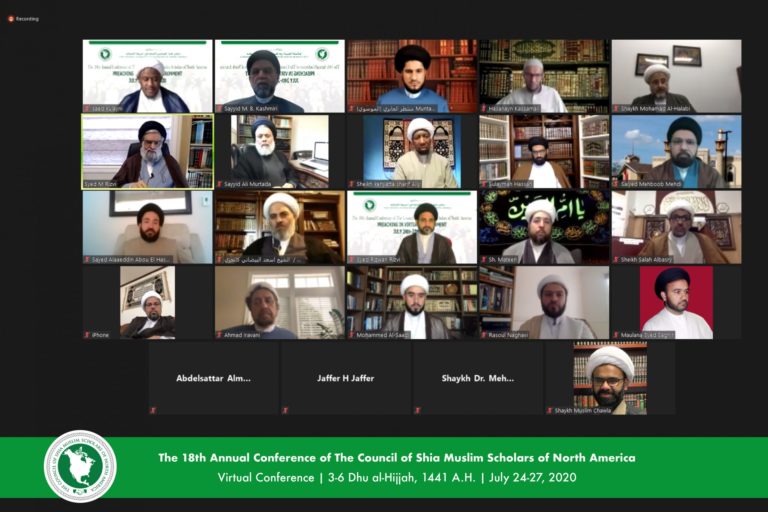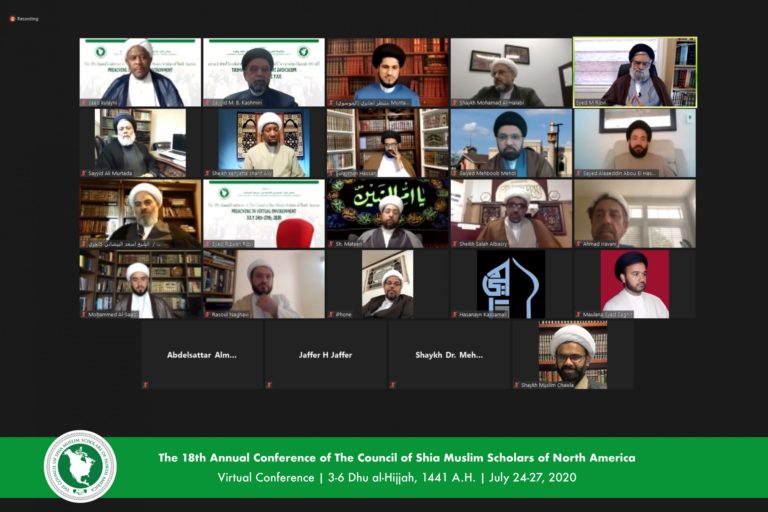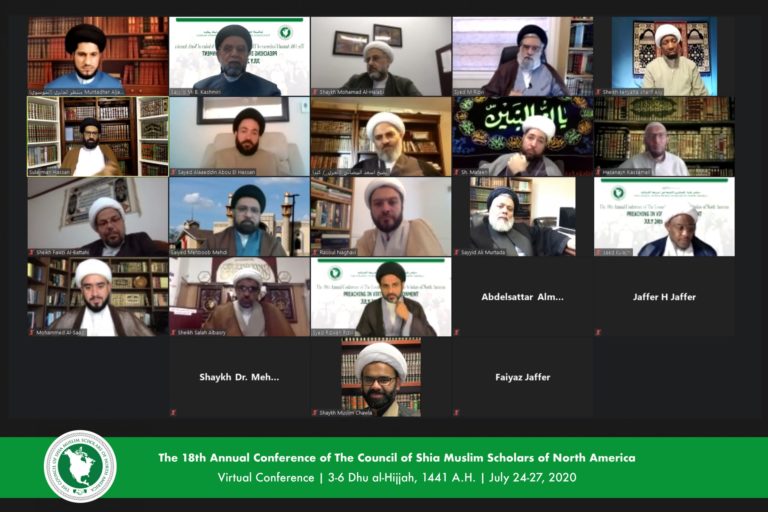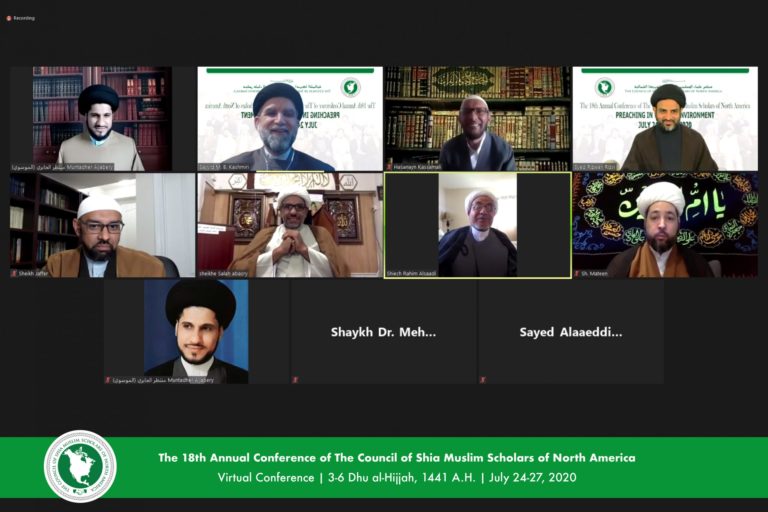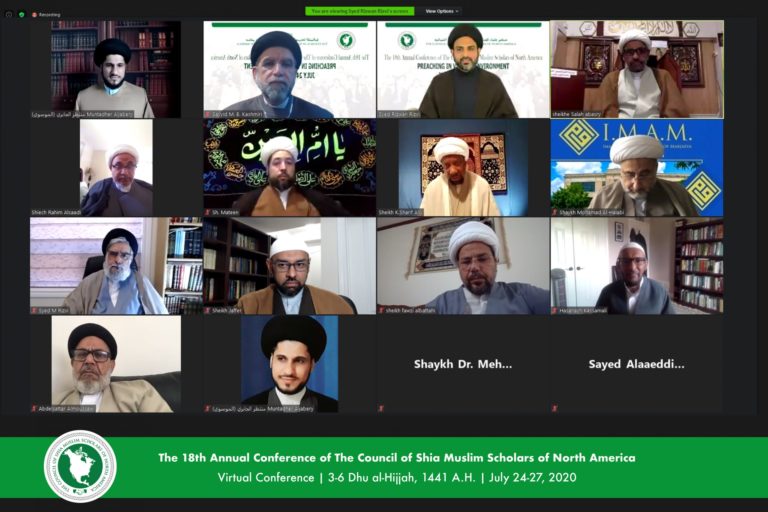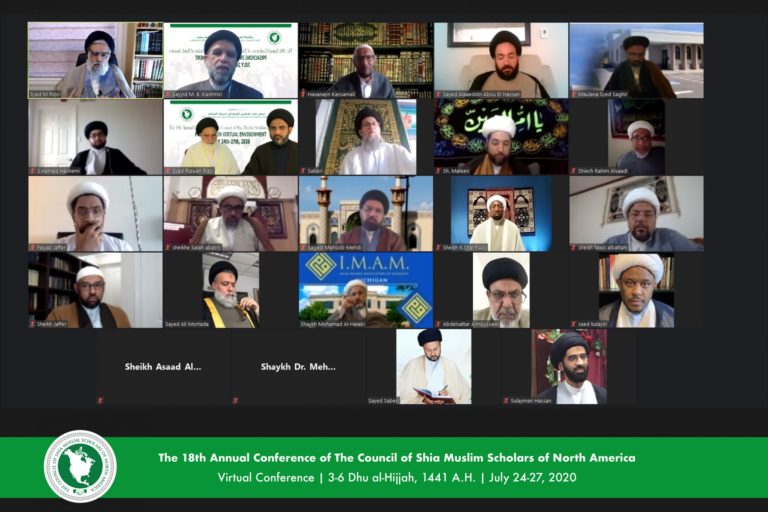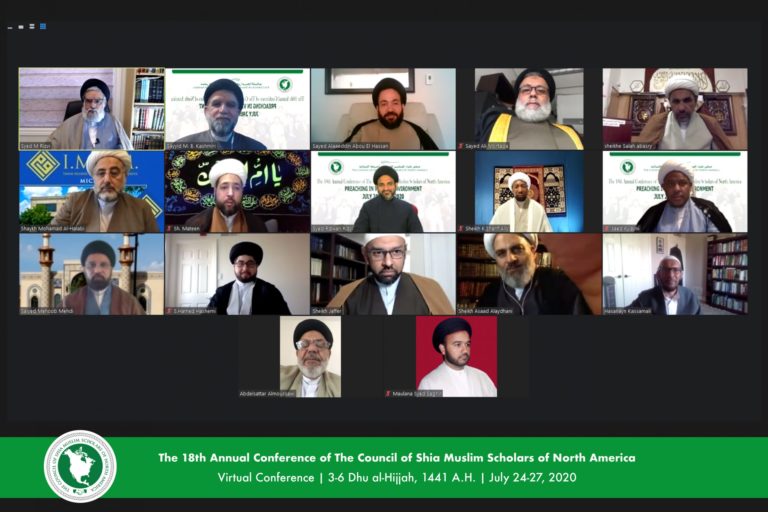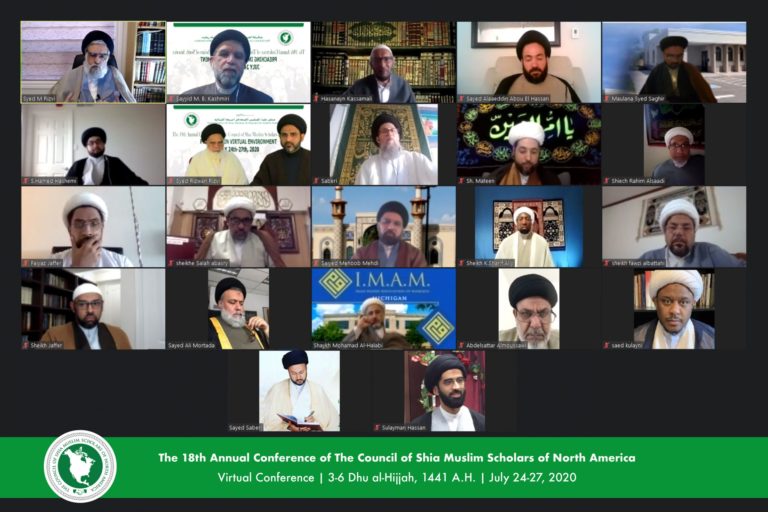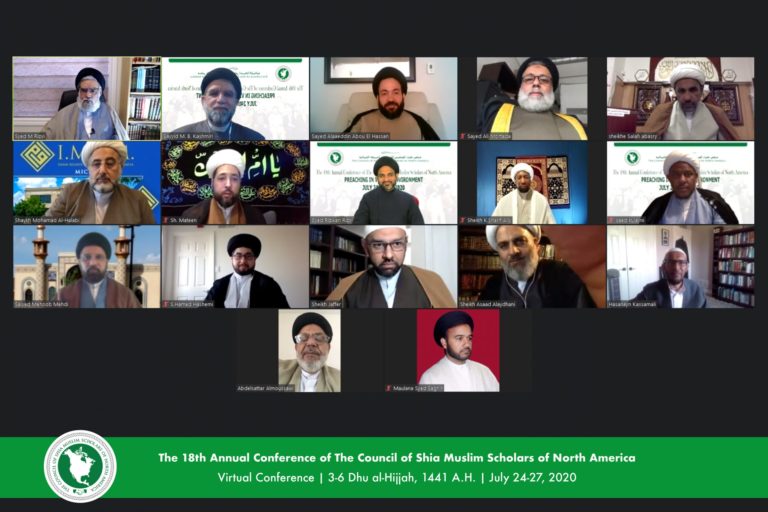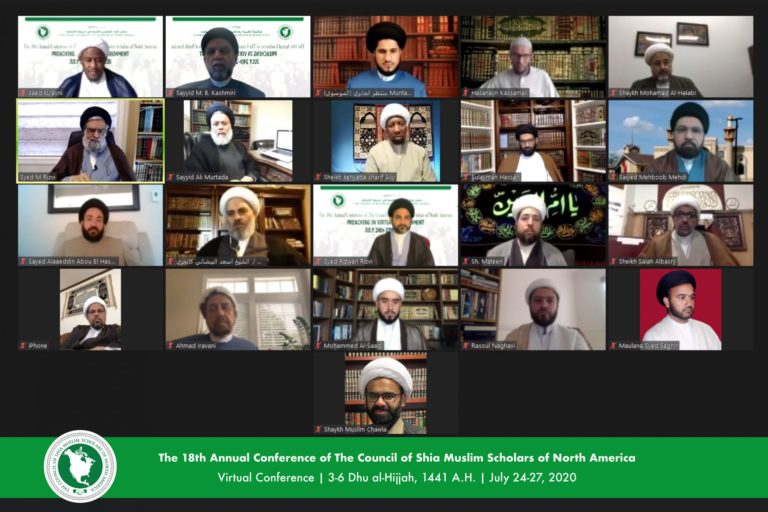The Council of Shia Muslim Scholars of North America holds a conference annually, that brings…
In the Name God, the Beneficent, the Merciful
May God shower His blessings on Prophet Muhammad & his pure progeny
Closing Statement of the 18th Annual Conference of the Council of Shia Muslim Scholars of North America
Inspired by the Quranic parable of the blessed tree which is firmly rooted and bears its fruit in every time, and pursuant to fulfillment of the lofty goals set forth in its charter, the Council of Shia Muslim Scholars of North America held its 18th annual conference virtually due to the ongoing coronavirus pandemic. The gathering was convened under the heading “Persistence, Perseverance, and Resolve: Finding New Ways to Serve in Challenging Times” with a group of scholars, preachers, and imams of different mosques and Islamic centers from across the United States and Canada participating in four sessions from July 24 to 27, 2020 (3 - 6 of Dhu al-Hijjah, 1441 AH). The scholarly discussion focused on preaching in a virtual environment, sharing experiences to improve the delivery of our message, providing uninterrupted religious services, and dealing with new challenges. After four days of discussions, the conference attendees were fully engaged and came to the following conclusions and recommendations:
- The Council appreciates the efforts and activities of all the respected scholars and preachers, not to mention all the Islamic centers and their leaders, who have strived to maintain the continuity of religious services for the various religious occasions, and have sustained outreach activities and educational initiatives since the start of the pandemic. Moreover, the Council lauds the efforts to preserve the bonds of brotherhood/sisterhood among community members despite the closures that have lasted for months. In view of the continuous risk and the warnings issued by the health authorities about the persistence (and rise) of COVID-19, it is imperative for scholars and preachers to develop their technical skills and become proficient in delivering their sermons, speeches, and lessons through virtual methods so that the community at large does not experience a lapse of any kind.
- The Council is delighted by the accomplishment of a group of respected scholars who established the first academic seminary, which has been named after Shaykh al-Mufid. The Mufid Academic Seminary (MAS) has both an undergraduate and a graduate program in collaboration with Georgetown University and its first academic sessions will be offered this fall. MAS’s goal is to educate and train individuals who have grown up in the West to become preachers who disseminate Islamic teachings to the younger generation. In addition, MAS will offer programs that develop qualified scholars for academic, social and outreach activities outside the Shia community. The Council encourages young high school graduates to apply to the program so our communities in the West can rely on highly-trained individuals and secure a prosperous future for our faith.
- The Council appreciates the great efforts of individuals and organizations who seek to shed light on the injustices being committed against Ahl al-Bayt (pbut) and their legacy, especially those that affect the whole of humanity. These initiatives are crucial because they represent universal principles and demonstrate the continuous need for sacrifice if we are to preserve human dignity and stop oppression. As such, it is paramount that we preserve the heritage of Ahl al-Bayt, which includes the sacred artifacts, the mosques, and holy shrines, none more than al-Baqee, which have been subject to vandalism and destruction, and continue to be violated to this day.
- The Council thanks all the respected believers who have continued to provide financial support to mosques, Islamic centers, schools, and Hussainiyyahs. Furthermore, it extends sincere gratitude to the organizations that have offered grants to Islamic centers experiencing financial hardship. Finally, the council appreciates the efforts of those individuals who participated in the conference and provided information and instructions on how to obtain grants and donations from entities capable of financial support.
- The sacred commemoration of Muharram, which marks the anniversary of the martyrdom of Imam al-Hussain (p) and the period when believers recall the painful event of Karbala, is drawing near. The Council advises the believers who are eager to revive the Hussaini legacy and are awaiting guidance, especially the leaders and administrators, to observe the following:
- All the jurists, including the supreme religious authority, Sayyid al-Sistani (may God prolong his life), have clearly stated that it is necessary for every believer to safeguard themselves and others from harm, especially when the risk occurs due to disregard of guidelines and instructions issued by healthcare professionals. Moreover, any reckless and callous behavior that leads to the spread of the coronavirus is cause for liability upon the guilty person for any harm that results, including any monetary compensation (diya) that is incurred in the event of death. Therefore, the Council stresses upon the respected believers and the management of Islamic centers, mosques, and Hussainiyyahs to strongly consider the consequences of opening their doors, especially if they do not adequately fulfill the official health and prevention guidelines. Furthermore, the Council also reminds the believers who hold gatherings and invite people to their homes, to not underestimate the seriousness of the current situation and the high risk of spreading the virus.
- There is no doubt in the importance of establishing Hussaini rituals. However, we must all bear in mind that their objective is not only to hold gatherings and offer food and drink in honor of Imam Hussain (p), but also to seek reform, spread justice and liberty, fight oppression, and acquire knowledge and moral virtues. Hence, we must not limit them and their broad impact to a single form of commemoration, which if stalled due to the coronavirus leaves us empty-handed. As such, we must always employ appropriate alternatives by which we can achieve the lofty goals of the Hussaini rituals. The current COVID-19 pandemic should motivate us to devise novel ways to remember the valor and sacrifice of Imam Hussain and achieve his goals in any circumstance.
- Every year, Hussaini councils generously offer various types of food and drink to the believers, moreover, some of these services are provided to fulfill obligatory vows. However, everyone should be aware of the risk of spreading the virus in the process of sharing and distributing food and drink. Therefore, if the believers’ vows are general and not specified to food and drink, the Council advises they donate money in honor of Imam Hussain (p) to Islamic centers, mosques and Hussainiyyahs instead, especially to the ones that are struggling financially and unable to cover their regular monthly expenses (e.g., mortgage). On the other hand, if the vows are specific to providing food and drink, then there is nothing wrong with distributing food supplies or vouchers to the poor and needy in the name of Imam Hussain. Surely, this will endear us to Imam Hussain and please the heart of the Imam of our time (p).
For detailed information and guidelines for Hussaini majalis from the Council of Shia Muslim Scholars of North America, please click on this link to view it.
The honorable participants concluded the virtual conference by expressing their gratitude to the organizing committee for sponsoring, managing, and holding the conference, which has been held continuously since 2004 with the support of I.M.A.M. Finally, the attendees prayed to God Almighty to save everyone from the current pandemic and provide a speedy recovery for all those who are sick and afflicted, and to prolong the lives of our great maraji’ and hasten the reappearance of the Imam of our time (peace be upon him), who will fill the world with justice and equity.
On behalf of the council,
Sayyid Muhammad Rizvi,
The Secretary General

